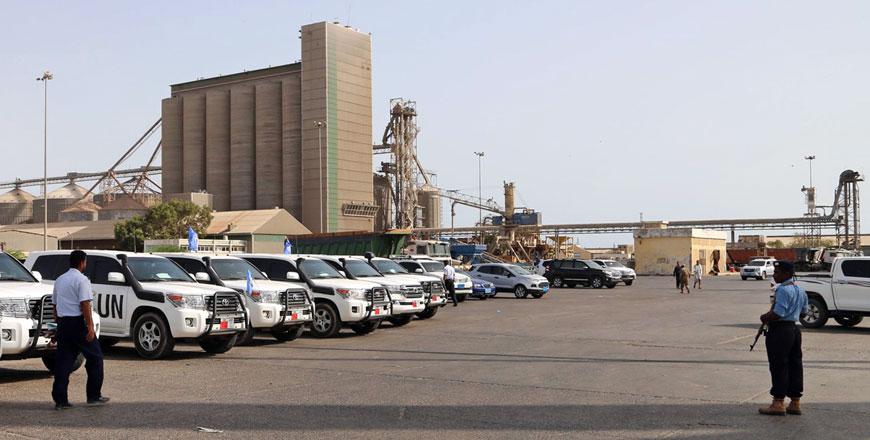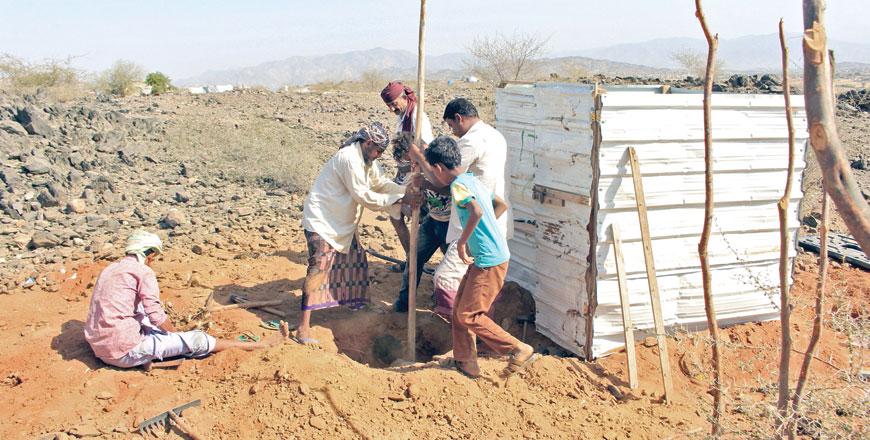You are here
Fighting grips Yemen's Hodeida port, complicating peace moves
By Reuters - May 16,2019 - Last updated at May 16,2019

This photo taken on Tuesday shows a general view of the Hodeida port in the Yemeni port city, around 230 kilometres west of the capital Sanaa (AFP photo)
DUBAI — Houthi fighters and Saudi-backed pro-government forces battled in Yemen's port city of Hodeida on Wednesday, breaching a ceasefire and potentially complicating a troop withdrawal agreement intended to pave the way for wider peace talks.
Hodeida port, which has been under Houthi control, is a lifeline for millions of Yemenis threatened by starvation because of the war as it is the main entry point for food imports and aid.
The Houthi withdrawal from Hodeida and two other Red Sea ports began on Saturday and was the most significant advance yet in efforts to end the four-year-old war.
The United Nations said on Tuesday the ports had been handed over to a coast guard and the pullout was going to plan.
But both sides reported renewed clashes on Wednesday, a day after the Iran-aligned Houthi movement claimed responsibility for a drone attack that Saudi Arabia said had hit two of its oil pumping stations.
Houthi-run media said pro-government forces had hit various parts of Hodeida city, including the airport, with heavy and medium weapons.
It did not say if they were Yemeni troops or members of an international military coalition led by Saudi Arabia which backs President Abed Rabbo Mansour Hadi's Aden-based government
The coalition-backed forces said in a report that Houthi fighters tried to infiltrate Hodeida and Al Duraihmi area to its south but pro-government troops foiled them.
Saudi Arabia and the United Arab Emirates, a leading member of the coalition, have yet to comment on the Houthi withdrawal.
The coalition has forces massed on Hodeida’s outskirts and under the withdrawal plan’s first phase, they are supposed to eventually also draw back.
Peace talks
United Nations Yemen Envoy Martin Griffiths called on the UN Security Council on Wednesday to urge the warring parties to work quickly to implement the remaining redeployments agreed during peace talks in Stockholm in December.
“We would like the parties to ensure that the momentum that we now begin to see is maintained by implementing subsequent steps of the mutual redeployments,” he told the 15-member body.
Griffiths said he was still seeking a deal between the parties on local forces to take over security in the area.
Acting US Ambassador to the United Nations Jonathan Cohen called on all parties to negotiate in good faith to reach a deal on local security forces, exercise restraint and to enable UN efforts on the ground, particularly by granting entry to the country for UN monitors.
“Obstruction of the UN process cannot be tolerated. For months apparent breakthroughs have happened just in time for Security Council briefings, then progress stalls,” he said. “Council members must consider how to hold parties responsible if they don’t implement the Stockholm agreement.”
Lt. Gen. Michael Lollesgaard, the head of the UN committee overseeing the withdrawal, said in Hodeida on Tuesday that the United Nations now had full access to the ports, which would allow its inspectors to check ships docking in the ports for any Houthi arms imports, he said.
It was not clear what effect the renewed fighting might have on the process.
France said on Wednesday the drone attacks on Saudi oil installations threatened regional security and it urged all sides to avoid an escalation that would put peace talks at risk. France is a major arms supplier to Saudi Arabia.
The ceasefire in Hodeidah has largely held despite intermittent shelling and skirmishes, but violence continues elsewhere in the country.
Saudi-owned Al Arabiya television said on Wednesday that government forces had killed 97 Houthi fighters in the governorate of Al Dhalea in southwest Yemen. There was no confirmation from the Houthis and Reuters could not immediately verify this.
The Saudi-led coalition, which receives weapons and other support from the West, intervened in Yemen in March 2015 after the Houthi movement ousted Hadi from the capital Sanaa. Hadi fled to Saudi Arabia while his internationally-recognised government based itself in the southern port city of Aden.
The war is seen as part of a wider regional conflict between Saudi Arabia and Iran. Tens of thousands of people have been killed, many of them civilians, and aid agencies say the humanitarian crisis is the worst in the world.
Related Articles
SANAA — A second round of negotiations between Yemen's government and Houthi rebels could be hosted "soon" in Jordanian capital Amman, a reb
HODEIDA, Yemen — Yemeni rebels have begun to withdraw from the port of Hodeida, the country’s key aid lifeline, under an agreement reached i
DUBAI — The United Arab Emirates, a leading member of a pro-government coalition fighting in Yemen, said on Wednesday it supports a UN plan

















